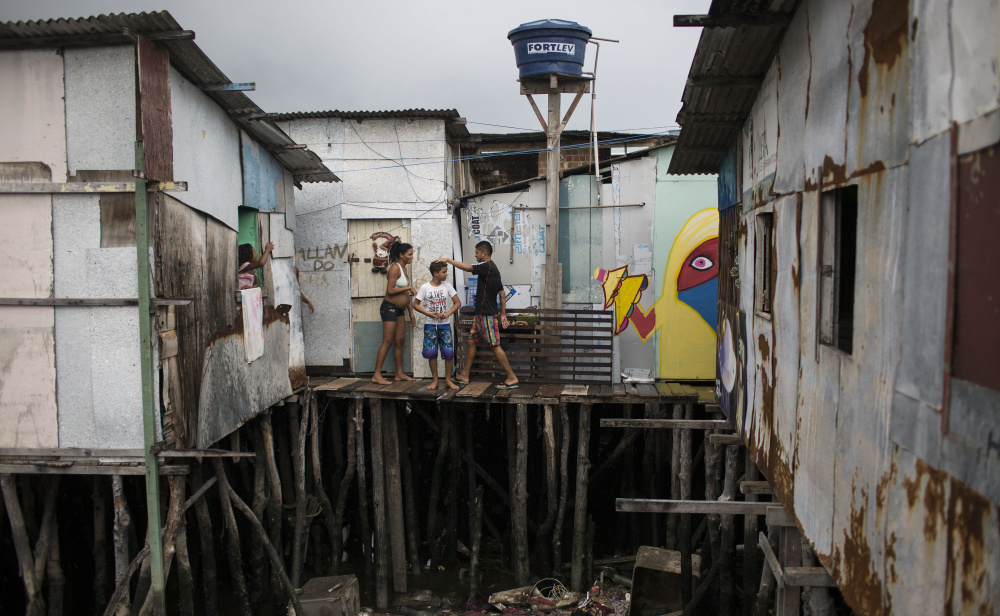RIO DE JANEIRO — Two Brazilian women, two pregnancies, one nightmare. But two very different stories.
Regina de Lima and Tainara Lourenco became pregnant at a scary moment – the dawn of an extraordinary Zika outbreak, as authorities came to suspect that the virus was causing an alarming spike in a rare birth defect called microcephaly. Both have reason to fear for the health of their unborn offspring.
But that is where the similarities end.
Lima is well-off and took advantage of the options of affluence. Lourenco lives in a slum. She has no options, except to hope for the best.
WORRIED SICK, BUT FINDS A WAY OUT
When Lima learned she was pregnant, her initial, vertiginous rush of happiness was almost immediately smothered by dread.
Lima and her husband had been trying to start a family but decided to put that on hold in late November, after the Brazilian government announced a possible link between mosquito-borne Zika and microcephaly, in which infants are born with unusually small heads and can sometimes suffer mental retardation or a host of serious health and developmental problems.
With more than 3,700 confirmed or suspected cases of microcephaly registered here since October – compared with fewer than 150 cases in all of 2014 – the Brazilian government took the drastic step of urging would-be parents to put off pregnancies.
But for Lima, an audiovisual producer from Rio de Janeiro, it was too late. She was already pregnant, and her first trimester – thought to be when the fetus is most susceptible to Zika – would coincide with Rio’s summer mosquito season.
“The first weeks were terrifying,” said Lima. “I cried and cried.”
She was haunted by fears she may have already had Zika without knowing it – the illness can cause a fever and red splotches on the skin but is asymptomatic in most cases – and that her baby would develop microcephaly.
So Lima did what growing numbers of wealthy Brazilian women are doing: She requested an extended vacation from work, packed her bags and left for Europe. She plans to stay at least through the end of the dicey first trimester.
“I am lucky to have options, to be able to make decisions,” Lima said in a telephone interview from London. “Most women in my situation don’t have that luxury. They’re completely at the mercy of fate.”
POVERTY-STRICKEN, HOPING FOR THE BEST
Unemployed and five months pregnant, 21-year-old Lourenco lives in a slum at the epicenter of Brazil’s tandem Zika and microcephaly outbreaks, the state of Pernambuco in Brazil’s impoverished and underdeveloped northeast.
Her shack is cobbled together from bits of wood, and perches on stilts over a giant puddle of fetid water below. To eke out a living for herself and her 2-year-old daughter, Lourenco ventures into a nearby swamp to hunt for crustaceans she hawks for $2.50 a kilogram.
“I think I got Zika or some other disease not long ago,” she said. “What can we do? Just hope that it doesn’t affect the baby.”
The only precautionary measure Lourenco could possibly take, long-sleeve clothing, is unworkable in the unrelenting equatorial heat.
Like many of the estimated 400,000 women currently pregnant in Brazil, she can’t afford mosquito repellent. And even if she could, microcephaly fears have sparked a run on repellents, emptying out the stock in many pharmacies in hard-hit areas.
The government has pledged to start providing repellent to low-income women and promises to deploy the military to help eliminate Aedes’ breeding places. But the measures are too little, too late for women whose worries about microcephaly have transformed their pregnancies into a period of unending anguish.
Copy the Story LinkSend questions/comments to the editors.



Success. Please wait for the page to reload. If the page does not reload within 5 seconds, please refresh the page.
Enter your email and password to access comments.
Hi, to comment on stories you must . This profile is in addition to your subscription and website login.
Already have a commenting profile? .
Invalid username/password.
Please check your email to confirm and complete your registration.
Only subscribers are eligible to post comments. Please subscribe or login first for digital access. Here’s why.
Use the form below to reset your password. When you've submitted your account email, we will send an email with a reset code.